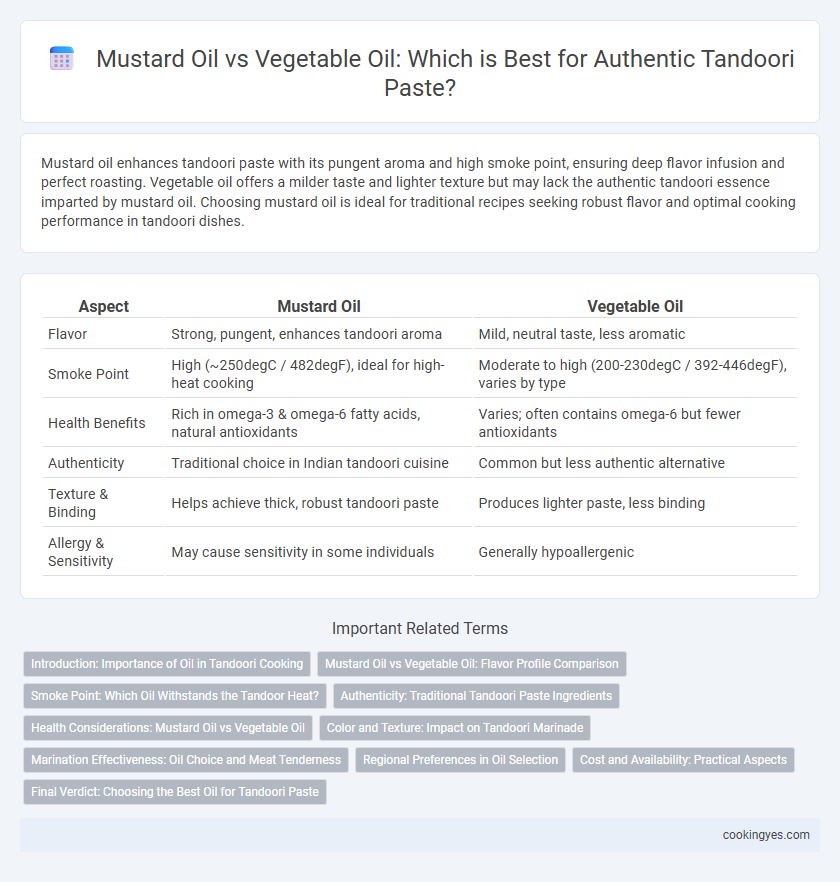Mustard oil enhances tandoori paste with its pungent aroma and high smoke point, ensuring deep flavor infusion and perfect roasting. Vegetable oil offers a milder taste and lighter texture but may lack the authentic tandoori essence imparted by mustard oil. Choosing mustard oil is ideal for traditional recipes seeking robust flavor and optimal cooking performance in tandoori dishes.
Table of Comparison
| Aspect | Mustard Oil | Vegetable Oil |
|---|---|---|
| Flavor | Strong, pungent, enhances tandoori aroma | Mild, neutral taste, less aromatic |
| Smoke Point | High (~250degC / 482degF), ideal for high-heat cooking | Moderate to high (200-230degC / 392-446degF), varies by type |
| Health Benefits | Rich in omega-3 & omega-6 fatty acids, natural antioxidants | Varies; often contains omega-6 but fewer antioxidants |
| Authenticity | Traditional choice in Indian tandoori cuisine | Common but less authentic alternative |
| Texture & Binding | Helps achieve thick, robust tandoori paste | Produces lighter paste, less binding |
| Allergy & Sensitivity | May cause sensitivity in some individuals | Generally hypoallergenic |
Introduction: Importance of Oil in Tandoori Cooking
Oil plays a crucial role in tandoori cooking by enhancing the marinade's flavor and aiding in the even cooking of meat and vegetables. Mustard oil, with its pungent aroma and higher smoke point, imparts a distinctive taste and withstands the high heat of the tandoor, making it a traditional choice in many Indian recipes. Vegetable oil offers a milder flavor and neutral profile, but it lacks the characteristic pungency and robustness that mustard oil contributes to authentic tandoori dishes.
Mustard Oil vs Vegetable Oil: Flavor Profile Comparison
Mustard oil imparts a pungent, sharp flavor with a slightly spicy undertone that complements the smoky, charred notes of tandoori dishes, enhancing the authentic North Indian taste. Vegetable oil offers a neutral, mild flavor, allowing the spices in the tandoori paste to stand out without overpowering the overall taste. Selecting mustard oil intensifies the aromatic depth and traditional flavor complexity, while vegetable oil provides a subtler, more versatile base for the marinade.
Smoke Point: Which Oil Withstands the Tandoor Heat?
Mustard oil has a higher smoke point of around 480degF (248degC), making it better suited to withstand the intense heat of a tandoor oven compared to most vegetable oils, which typically smoke around 400degF (204degC). This higher smoke point ensures the tandoori paste retains its flavor without burning or producing harmful compounds during cooking. Using mustard oil enhances the authentic smoky aroma and prevents the paste from breaking down under extreme tandoor temperatures.
Authenticity: Traditional Tandoori Paste Ingredients
Mustard oil is preferred over vegetable oil in traditional tandoori paste for its robust, pungent flavor that enhances the authenticity of classic Indian barbecue recipes. The natural smokiness and slight bitterness of mustard oil complement the spices like red chili, turmeric, and garam masala, delivering the distinctive taste associated with authentic tandoori dishes. Vegetable oil, being more neutral, lacks the depth and cultural significance integral to traditional tandoori marinade formulations.
Health Considerations: Mustard Oil vs Vegetable Oil
Mustard oil contains higher levels of monounsaturated fats and omega-3 fatty acids, which contribute to cardiovascular health and anti-inflammatory properties, making it a beneficial choice for tandoori paste. Vegetable oil, often refined and higher in omega-6 fatty acids, can promote inflammation if consumed excessively, potentially impacting heart health negatively. Choosing mustard oil over vegetable oil for tandoori paste enhances the nutritional profile by providing essential fatty acids while minimizing the risk of chronic inflammation.
Color and Texture: Impact on Tandoori Marinade
Mustard oil imparts a rich golden hue and a slightly grainy texture to tandoori paste, enhancing the vibrancy and authenticity of the marinade. Vegetable oil, being lighter and more neutral, results in a smoother texture but a paler color, which may diminish the traditional visual appeal. The choice between mustard oil and vegetable oil significantly affects the tandoori marinade's aesthetic and textural depth, influencing both presentation and mouthfeel.
Marination Effectiveness: Oil Choice and Meat Tenderness
Mustard oil enhances tandoori paste marination by penetrating meat fibers more effectively, resulting in superior tenderness and flavor absorption compared to vegetable oil. Its pungent aroma and higher smoke point intensify spice infusion during cooking, promoting a more aromatic and juicy tandoori dish. Vegetable oil, being milder and less robust, often leads to less intense marination, impacting the overall texture and taste of the meat.
Regional Preferences in Oil Selection
Regional preferences in oil selection for tandoori paste vary significantly, with mustard oil predominantly favored in North Indian, Punjabi, and Bengali cuisines for its pungent flavor and high smoke point, enhancing the authentic tandoori taste. Vegetable oil, commonly used in Southern and Western India, offers a neutral flavor that allows the spices to shine without overpowering the dish. Mustard oil's antimicrobial properties make it a traditional choice where tandoori cooking is deeply rooted in regional culinary practices.
Cost and Availability: Practical Aspects
Mustard oil offers authentic flavor for tandoori paste but tends to be pricier and less widely available compared to vegetable oil, which is more cost-effective and accessible in most grocery stores. Vegetable oil's neutral taste and lower price make it a practical choice for large-scale or everyday tandoori preparation. Cost efficiency and availability of vegetable oil ensure consistent supply without compromising the cooking process in commercial and home kitchens.
Final Verdict: Choosing the Best Oil for Tandoori Paste
Mustard oil imparts a pungent aroma and authentic flavor to tandoori paste, enhancing its traditional taste and providing antimicrobial properties that improve preservation. Vegetable oil offers a neutral taste and higher smoke point, making it suitable for cooking at high temperatures without overpowering the marinade's spices. For an authentic, flavorful tandoori experience, mustard oil is the preferred choice, while vegetable oil serves as a milder alternative for sensitive palates.
Mustard oil vs Vegetable oil for tandoori paste Infographic

 cookingyes.com
cookingyes.com